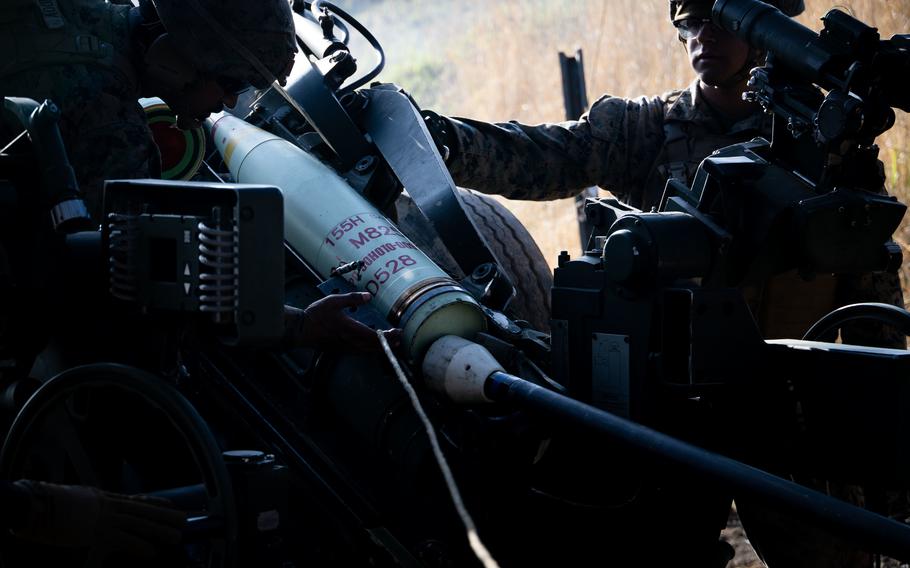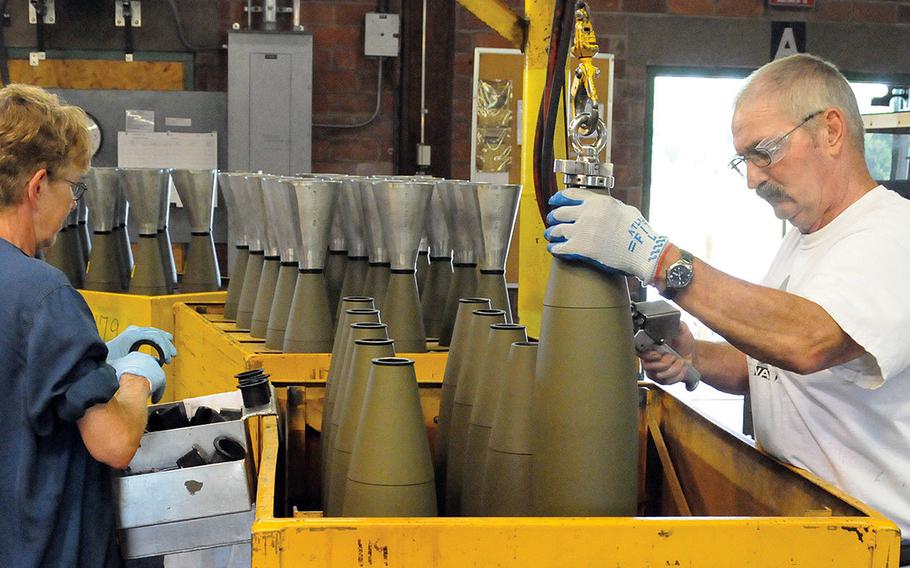
U.S. Marines load a round into a 155 mm howitzer during training in Japan on April 16, 2022. NATO Secretary-General Jens Stoltenberg is urging allies to ramp up domestic weapons production as the Russia-Ukraine war shows no signs of ending soon. (Jennifer Andrade/U.S. Marine Corps)
Depleted weapons stockpiles and a dangerous security outlook mean NATO countries need to ramp up arms production for the long haul, the alliance’s top official said Wednesday.
Secretary-General Jens Stoltenberg’s remarks at a gathering of defense industry leaders in Sweden came as Western militaries come under pressure to supply arms to Israel and Ukraine.
Stoltenberg said in Stockholm that even when the war in Ukraine ends, allies will need to be on a war footing when it comes to rearming.
“There is no turning back to where we were before,” Stoltenberg said. “We face a more aggressive Russia, a more coercive China and a more unstable world. So we must adapt for the long term.”
NATO countries and their defense contractors have struggled to keep pace with the demand from the Russia-Ukraine war. Now, there is competing demand amid support for Israel as it prepares for a ground offensive into Gaza.
The Pentagon said Tuesday that the U.S. is pressing industry to bolster its capacity, especially production of high-demand 155 mm artillery rounds, which can be used on a wide array of systems.
“We have been working closely with industry, not only in the United States, but working with our allies and partners and their defense industrial base to look at ramping up production,” Pentagon spokesman Brig. Gen. Patrick Ryder said.
Ryder said the U.S. is confident that the needs of both Israel and Ukraine will be met. Still, others in the alliance have sounded the alarm.

Employees at the Iowa Army Ammunition Plant prepare 155 mm artillery rounds to be filled in October 2020. The versatility of the rounds has made demand for them high in Ukraine, and Western suppliers are struggling to keep pace. (Joint Munitions Command)
Dutch Adm. Rob Bauer, head of NATO’s Military Committee, warned earlier this month that when it comes to stockpiles, “the bottom of the barrel is now visible.” He didn’t specify which forms of weaponry were running out fastest.
A dilemma for Western militaries is how to strike a balance between having large stockpiles on hand and enough spare capacity to quickly ramp up when demand increases.
Critics argue that the current setup, designed around a “just in time” supply chain business model, falls short on both counts.
On the question of how to pay for it all and put in place the industry regulations to make larger stockpiles a reality, Stoltenberg said there isn’t a clear path.
“I don’t know the answer, but I know that we have not enough spare capacity today,” he said.
Stoltenberg said allies need to invest to ensure that Ukraine gets what it needs because “courage alone does not stop drones and heroism cannot intercept missiles.”
There is no end in sight to the demand, as the war appears likely to stretch into a third year in February. Allies have pumped tens of billions of dollars in arms into Ukraine ranging from Abrams and Leopard tanks to air defense and munitions.
“We have mainly done this by depleting our own stocks,” Stoltenberg said. “And that is not sustainable. So now we need to ramp up production to meet Ukraine’s needs but also to strengthen our own deterrence and defense.”

NATO Secretary-General Jens Stoltenberg participates in a forum in Stockholm, Sweden, Oct. 25, 2023. (NATO)